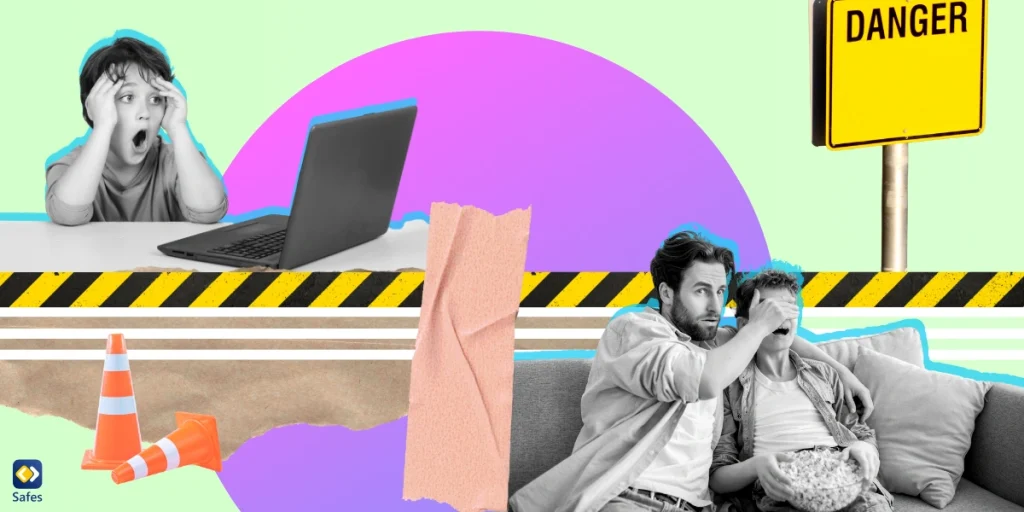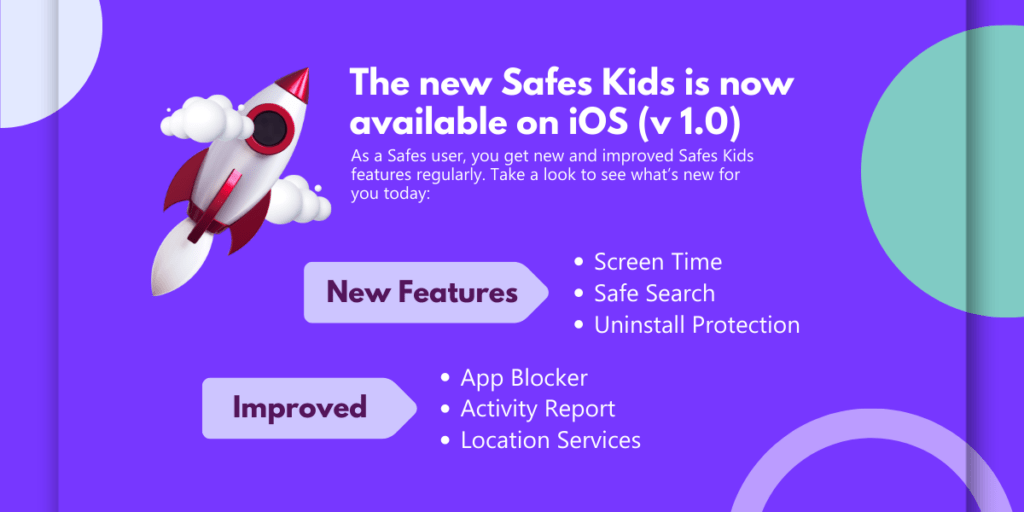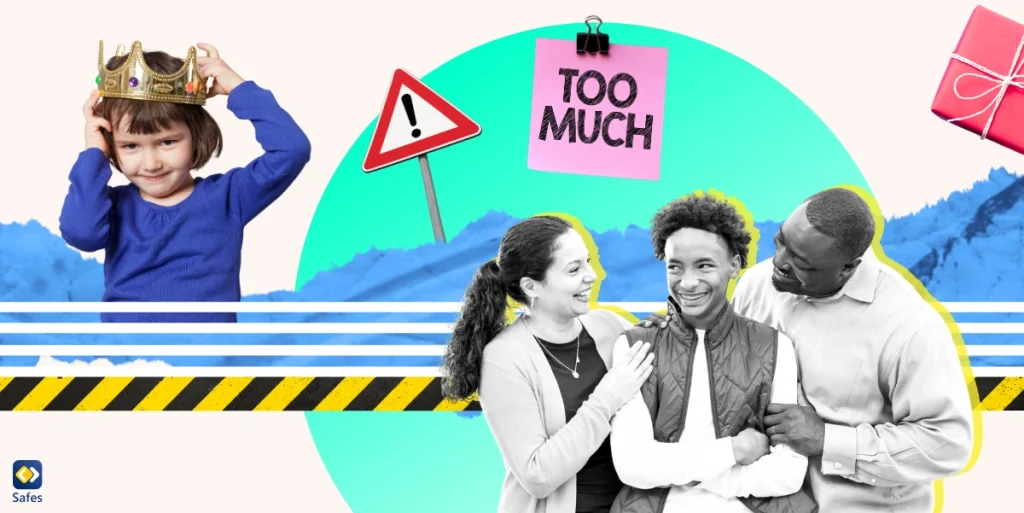Children are constantly exposed to all types of content and encountering inappropriate texts, images, or videos is inevitable. They are curious and may not be able to resist watching adult content that they usually find appealing. As parents, we need to shield our children from harmful content, whether it’s mature videos online, inappropriate shows on TV, or unsuitable content in video games. It’s essential to address these situations calmly and effectively, rather than reacting with panic or frustration.
In this blog post, we’ll explore practical steps you can take when you discover your child watching things that aren’t suitable for their age. But first, let’s see if it’s normal for your kids to watch inappropriate content or if this is a major issue.
Is It Normal for Kids to Look Up Inappropriate Things?
According to Dr. Nicole Beurkens, a child psychologist, kids are curious by nature. This can lead to discovering their world, either proper or improper things. Therefore, it’s not uncommon for kids to stumble upon or seek out inappropriate content, especially as they become more curious about the world around them.
Based on a study on the impact of media use on children and youth children are constantly exposed to mature content in TV programs, music videos, and video games. Moreover, with easy access to the internet and various media platforms, children may encounter content that is not suitable for their age. Curiosity, peer influence, or simply accidental exposure can all contribute to this behavior.
However, you need to understand that while it may be common for children to explore such content, it’s not necessarily healthy or acceptable. As parents, it’s our responsibility to guide them and provide appropriate boundaries.

What Happens When a Child Is Exposed to Inappropriate Content?
As mentioned before, watching age-inappropriate content is normal for kids. However, this should not underestimate the fact that this behavior leads to several consequences for inappropriate internet use, such as:
Confusion and Misunderstanding: Young children may not fully understand what they’ve seen or heard, leading to confusion or misunderstanding about the content’s meaning or implications.
Emotional Distress: Exposure to disturbing or violent content can evoke feelings of fear, anxiety, or distress in children. They may struggle to process the content and cope with their evoked feelings.
Behavioral Changes: Some children may show changes in behavior after exposure to inappropriate content, such as increased aggression, withdrawal, or acting out in ways that mimic what they’ve seen.
Desensitization: Repeated exposure to mature content may desensitize children to its effects over time. They may become less sensitive to violence, explicit language, or other harmful elements. This can potentially influence their attitudes and behaviors.
Developmental Impact: Age-inappropriate content can harm a child’s cognitive, emotional, and social development. It may shape their perceptions, beliefs, and values in unhealthy ways.
Negative Effects on Relationships: Not only may these pieces of content strain relationships between children and their parents, but they may also affect the child’s future relationships.
How Do I Stop My Child from Watching Inappropriate Things?
Suppose that you’ve realized your child watches adult content on the internet. There are a few things you can do to make sure your communication with them is effective and they won’t repeat this action. We can divide the whole process into three steps which are explained below.
Step 1: Staying Calm and Supportive
Remember that the essence of adult material is appealing to everyone, especially for your curious child. Reacting with anger or panic may escalate the situation. So, stay calm to address the issue effectively. Do not catch them while watching inappropriate things, as it may leave them with anxiety and lasting negative impacts.
Step 2: Having Open Conversations and Set Boundaries
Talk to your child about what they’ve seen and why it’s not suitable for them. Use simple language to explain the content’s impact. Also, discuss what types of content are acceptable for your child to watch and what is off-limits. Explain the reasons behind these rules in age-appropriate terms.
Additionally, teach your child about internet dangers and how to critically evaluate what they see online, and question sources. Remind your child to stay safe in the online world by avoiding clicking on suspicious links, not sharing personal information online, and being cautious when interacting with strangers. Remember to stay calm and supportive during the conversation and assure them that they can come to you with any questions or concerns.
Step 3: Monitoring Their Online Activities
Now that you’ve convinced your child about the effects of watching inappropriate content, give them time to practice your solutions and advice. Meanwhile, you can take advantage of parental control features available on devices, such as Windows parental controls. These tools allow you to block or restrict access to inappropriate content based on ratings, categories, or specific websites. With parental control features, you can regularly check your child’s browsing history and the apps they use to see what they’ve been exposed to.
To access all the parental control features, you need a tool that offers every option you need, from screen time limits to blocking certain websites. That’s why tools like Safes, our parental control app, can be invaluable. With Safes, you can monitor and manage your child’s online activities, block inappropriate content, set screen time limits, and get alerts and reports.

How Do I Teach My Child Not to Say Inappropriate Things?
One of the consequences of watching and listening to inappropriate content for children is that they tend to use inappropriate language when talking to others. Children often learn by imitating the behavior of others around them, either in their family or media. Therefore, you should be mindful of the language you use and the way you communicate with others, as well as monitor the content type your child is exposed to.
When your child says something inappropriate, address it promptly and calmly. Then, establish clear rules about what language is acceptable and unacceptable in your household. Also, praise them when they use appropriate language and communication skills. Positive reinforcement encourages them to continue having desirable behavior. Another important factor in stopping your child from swearing is to teach them about the importance of empathy, respect, and consideration for others’ feelings when communicating. Help them understand the impact of their words on others and encourage them to think before they speak.
Final Word
By and large, do not panic when you see your child watching age-inappropriate things on the internet, as it’s a normal fact. However, make sure you address this issue calmly and effectively by having open communications, setting rules, and monitoring their online activities. This way, we can help our children explore applications and websites responsibly.
One crucial factor in protecting your child in the digital world is tracking their activities to prevent any risky behavior. That is why we recommend using Safes to have peace of mind that you have everything under control. Safes is available for download on both Android and iOS devices, making it easy to safeguard your child’s online experiences wherever they go. Additionally, you can try our free trial to experience the benefits for yourself. Using Safes alongside proactive parenting strategies allows our children to make safer and more responsible choices online, ensuring their digital well-being for years.




